Business bulletin: 30 May 2019
Build brand and awareness by becoming an OBM event partner
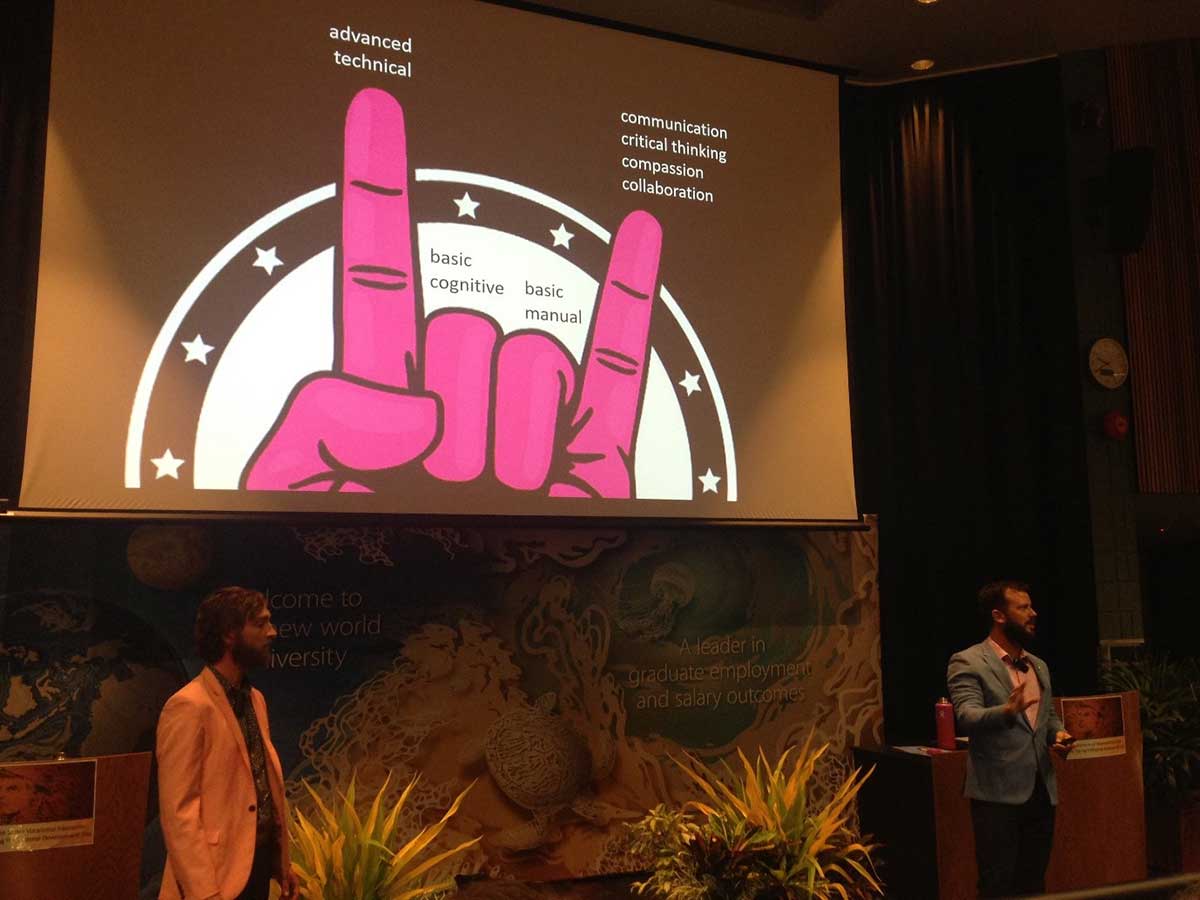
Caption: The Future of Work presentation at last year’s successful OBM
The Northern Territory’s Industry Skills Advisory Council (ISACNT) is thankful that it decided to be a major event partner and gold sponsor with October Business Month (OBM).
General Manager Debbie Paylor encourages others to consider getting involved this year as there are considerable benefits such as:
- significantly increased publicity of ISACNT’s brand and wider awareness of the purpose of ISACNT with NT businesses
- leveraging off the month-long OBM calendar of events and extensive marketing campaign
- an opportunity to use storytelling to share information and ISACNT’s key message about jobs and skills for the future
- increases in web traffic to ISACNT online spaces
- partnership and co-branding to expand ISACNT’s audience and networks
OBM had 200 partner events last year.
ISACNT, which gives advice on the development of a skilled workforce and carries out research on vocational education and training, brought in Future Crunch to deliver the Future of Work presentation, which was voted the best non-keynote event for OBM last year.
Future of Work demonstrated how technology is redefining work in the 21st century, as well as provided critical insights for businesses searching for innovative thinking to effectively manage people and adapt to the ever-changing world of industry.
The presentation started a quirky trend in the Territory. A memorable take-home message from the presentation was the rock and roll hand of skills, which illustrated robots were not going to take over all jobs, just the dangerous, lower-skilled, repetitious tasks.
People used the salute to greet each other as a reminder of where to focus effort for the jobs of the future.
Register now to be an OBM event partner
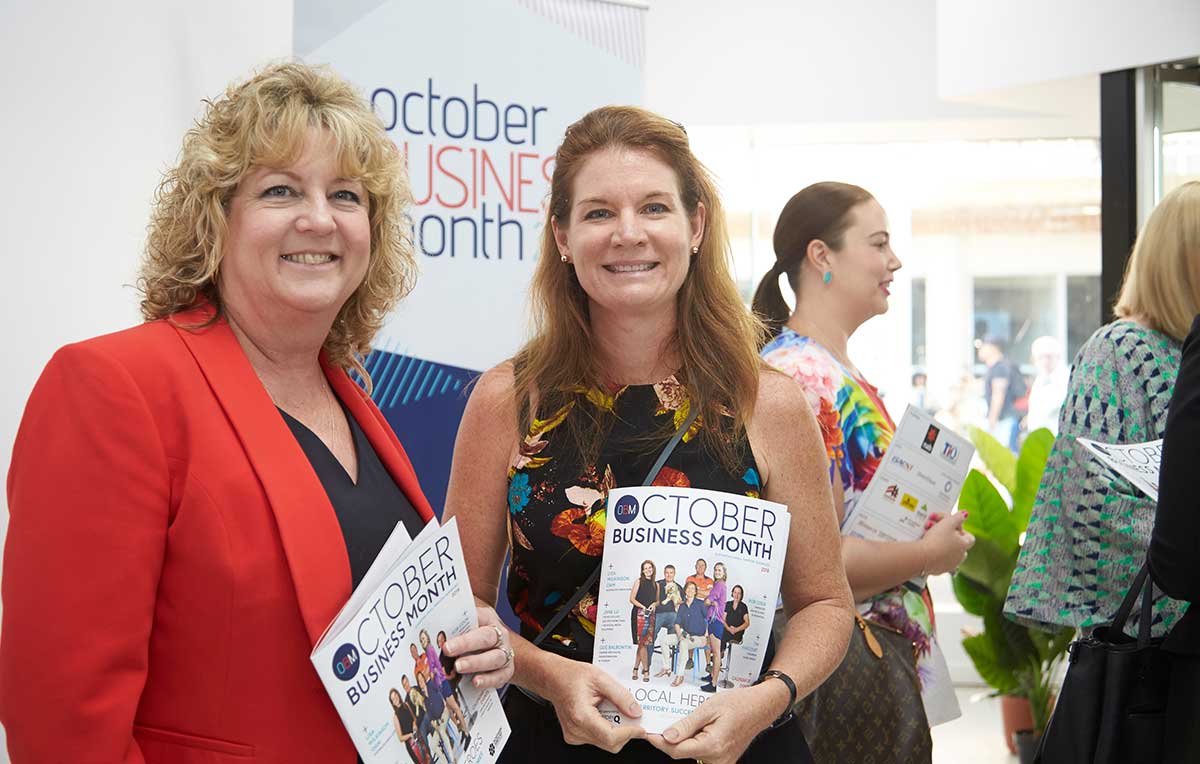
Caption: Attendees enjoying OBM in 2018.
Territory businesses are encouraged to share their expertise by becoming an event partner as part of the inspiring and educational October Business Month (OBM) program.
Almost 9,000 people attended OBM in 2018 with 200 business events held across the Territory. Keynote events featured local and national speakers, covering a range of subjects relevant to local businesses.
OBM is the perfect platform to show the Territory business community what you can do and how you add value to your sector. OBM is held throughout October, giving attendees 31 days of events to take advantage of new information, training in practical skills and networking opportunities for people looking to start.run.grow. a business in the Territory.
OBM event partner applications close on 13 June 2019.
To become an OBM event partner this year, an event must fit one of 2019’s themes or series:
- business innovation and digital disruption
- digital marketing
- leadership, motivation and inspiration
- NAB’s Small Business Toolbox (tangible and practical business skills for small business ie financial management, workforce, planning, IT, risk management etc)
- TIO Tradie Talks (sessions aimed at business people in the trades)
- industry sessions (tailor your content, delivery method and dates / times to specific industries to encourage new attendees to OBM and more curated learnings)
- Innovation Week, 7 to 11 October.
For more information, go to the October Business Month website.
Public consultation now open on no-go zones for onshore gas
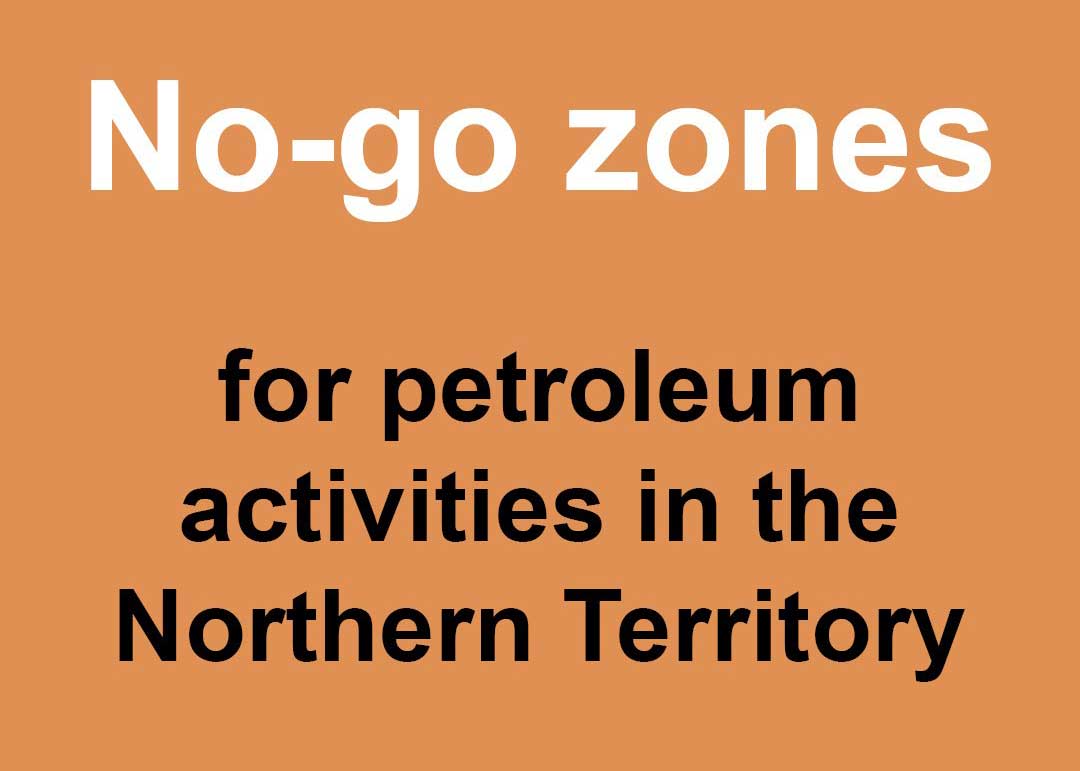
Caption: Submissions are open until 21 June 2019
Territorians are invited to comment on the areas proposed to be protected from exploration or production activities related to onshore petroleum.
A reserved block, or no-go zone, is land that is not able to be considered as part of a land release for exploration, and companies are not able to apply for an exploration permit or licences for these areas.
The declaration of reserved blocks is part of the Territory Government’s implementation of the 135 recommendations of the Scientific Inquiry into Hydraulic Fracturing in the Northern Territory (NT). Areas of land are declared as reserved blocks under section 9 of the Petroleum Act 1984.
The inquiry determined, through its research and consultation, there should be areas that are off limits to any petroleum exploration or production activities. This is due to these areas’ unique values, or their important role in providing environmental, social, health and cultural benefits to surrounding communities.
The total area of these proposed reserved blocks is 654,900 square kilometres or 48.44% of the NT.
The areas identified to be declared as reserve blocks are:
- areas of high tourism value
- towns and residential areas (including areas that have assets of strategic importance to nearby residential areas)
- national parks
- conservation reserves
- areas of high ecological value
- areas of cultural significance
- Aboriginal protected areas.
The inquiry also recommended that exploration permits should not be granted in areas that do not contain petroleum potential.
The Territory Government has worked to identify areas of the NT that align to the categories listed in the inquiry’s recommendations for reserved blocks and areas of no geological prospectivity for petroleum activities.
The Territory Government will consult with Traditional Owners through the relevant land councils to determine whether or not they would like to declare areas within Aboriginal land as reserved blocks.
In detailing these proposed reserved block areas the Territory Government has considered a number of other existing factors such as granted exploration permits that have potential reserved block areas within them and Aboriginal Land and the Aboriginal Land Rights Act (ALRA).
There will be some areas that can be declared reserved blocks very quickly, while other areas will take some time, and likely require negotiation with exploration permit holders.
It is anticipated that the areas that have been identified by the criteria set out in the inquiry’s reserved block recommendations that have no direct impact with granted exploration permits or are on Aboriginal land will be declared a reserved block later this year.
Comments received from the public during the consultation will be considered by the Territory Government before it finalises reserved block areas where onshore petroleum activity will not occur in the NT.
The Territory Government will negotiate with petroleum companies who hold granted exploration permits and have applications for exploration permits (that are not on ALRA land) to ensure the areas the inquiry identified should be declared reserved blocks are removed from existing permits and not be considered during the permit application process.
A consultation paper is available to view online at the Territory Government’s Have Your Say website.
Submissions can be made via the website or via email info.dpir@nt.gov.au
Public submissions are open until 21 June 2019.
Gulkula is a growing success
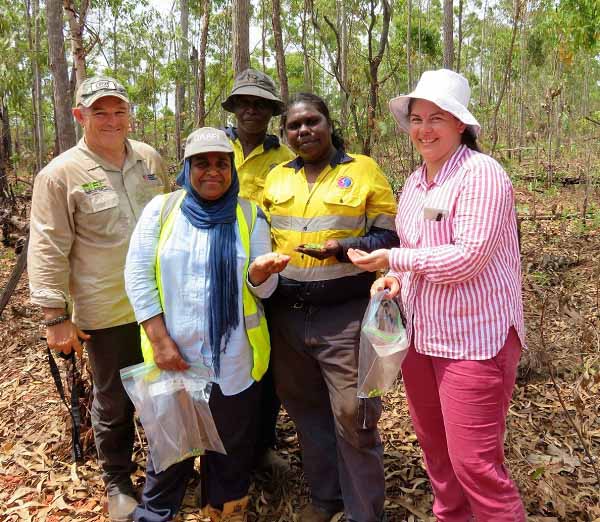
Caption: Julian Gorman of Charles Darwin University, Dr Yasmina Sultanbawa of the Queensland Alliance for Agriculture and Food Innovation, Kevin Wanambi of Gulkula, Renee Wanambi of Gulkula and Selina Fyfe of the Queensland Alliance for Agriculture and Food Innovation
Territory Government grants have helped Aboriginal people find the perfect recipe for a successful bush tucker nursery in Arnhem Land.
Support under the Aboriginal Employment Program enables the Gulkula nursery to employ Aboriginal supervisors and an all-Aboriginal work crew.
And an Aboriginal Responsive Skilling Grant funded non-accredited training for the building of the nursery, as well as the production of seed propagation and tube stock tables.
Mine Manager Ken Kahler says benefits of the Bush Food Project include:
- long-term employment for local Aboriginal staff
- improved economic and social wellbeing of Aboriginal communities by developing a culturally and economically viable business
- linking social, environmental and economic goals by ensuring the project has achievable objectives identified after consultation with Traditional Owners
- enhanced partnerships, linkages and trust between community, government and the private sector in developing the capacity of Aboriginal communities to take part in the real economy
- provide technical expertise, mentoring and hands-on training on country for existing and new mine projects.
Gulkula environmental advisor Annemarie van Doorn says the nursery supports the land rehabilitation program at Gulkula, including the collection and growing of local plant species.
One of the nursery workers, Mayila, says: “I am Dhalwangu man from Gurrumuru and I work in the Gulkula nursery from Monday to Friday.
“My favourite part of my job is seeing the plants grow after I have planted them. It’s like seeing life grow in front of you.”
Gulkula held a bush food workshop late last year that attracted senior Gumatj clan members, Dhimurru and Yirralka rangers, and specialists from Charles Darwin University and the University of Queensland.
“There was great interest and enthusiasm for the bush food industry by all the workshop participants,” says Dr van Doorn,
She says there are many lessons to learn from the commercial success of the Kakadu plum.
Laboratory analysis shows that the green plum has good commercial potential; other species with potential include acacias, native peanut, wild peach and native yams.
The emphasis is on species that are important to Yolŋu people.
Gulkula has been working on propagation techniques and planting of bush foods in rehabilitation areas since last year. Gulkula will continue working with researchers on the Bush Food Project.
The work has provided a deep insight into the flora species of the Dhupuma Plateau and their cultural importance.
Engineering and instrumentation expo coming to Darwin
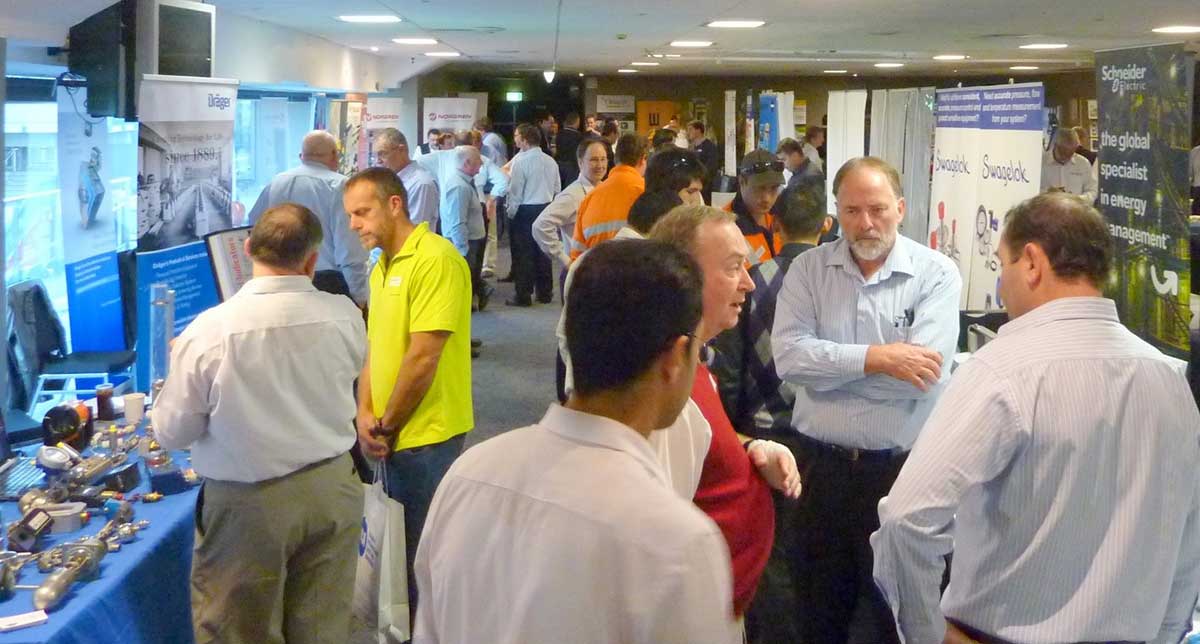
Caption: The Institute of Instrumentation Control and Automation Australia is holding a Technology Expo in Darwin on 12 June
Innovative engineering industry products will be on show at a Technology Expo to be hosted in Darwin next month by the Institute of Instrumentation Control and Automation Australia (IICA).
The expo will be held at DoubleTree Hilton on Darwin’s Esplanade on 12 June from 3pm to 7pm. Entry is free.
The exhibition is designed for everyone involved in the engineering field - from the shop floor to the top door - including designers, engineers, technicians and operators, purchasing and management.
The expo will feature over 40 national, international and local exhibitors for an afternoon of networking and to show off cutting edge developments in the instrumentation control and automation industry.
It is one in a series of events the IICA holds every year across Australia to provide an opportunity for people to view the latest engineering products first-hand and talk to the manufacturers, suppliers and experts who know them best.
The IICA is a non-profit organisation which recently celebrated 75 years of operations. This is the first time in 10 years that an IICA expo has been held in Darwin.
The IICA invites businesses and industry to come along and learn about solutions to suit business and tap into the minds of experts, while also taking the opportunity to network with like-minded people.
For more information go to the IICA website or email vic@iica.org.au

Give feedback about this page.
Share this page:
URL copied!